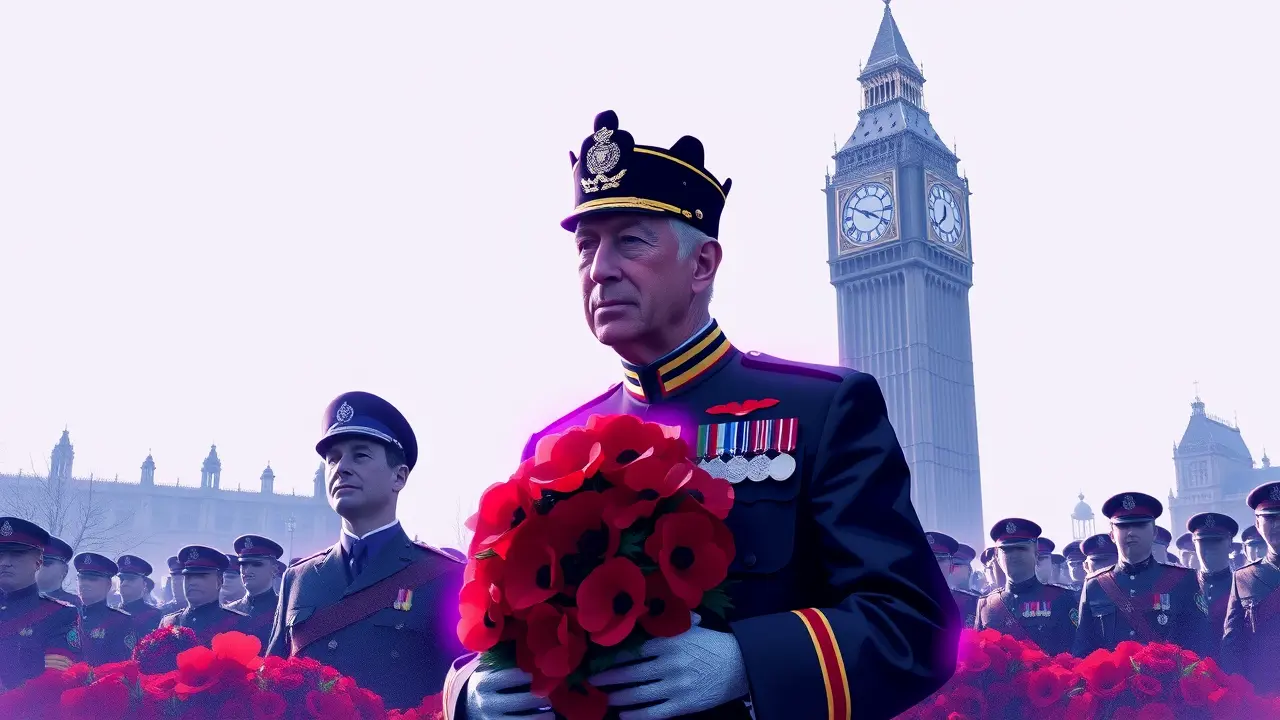
Politicsconflict & defenseWar Reports and Casualties
King Charles Leads UK's Annual Remembrance Sunday Ceremony.
RO
Robert Hayes
11 hours ago7 min read1 comments
King Charles led Britain’s annual ceremony of remembrance for the country’s war dead on Sunday, a solemn tradition unfolding under the incongruous warmth of a November sun, yet profoundly shadowed by the grim, almost four-year-old war in Ukraine—a contemporary conflict that lends a piercing urgency to this historic ritual. As the great bell of Big Ben tolled the eleventh hour, a profound silence descended upon the thousands assembled in central London—military personnel ramrod straight in their dress uniforms, veterans with chests heavy with medals, and members of the public united in quiet contemplation—a two-minute vigil for the fallen, a national breath held and then released by the stark report of a single artillery round and the haunting, melodic lament of Royal Marines buglers sounding ‘The Last Post’.The 76-year-old monarch, dignified and resolute, embodied the continuity of the Crown and the state, a figurehead whose personal military service and lifelong dedication to the armed forces provided a deeply personal connection to the day's gravitas, reminiscent of the stoic leadership his mother, Queen Elizabeth II, displayed for decades. This ceremony, rooted in the armistice that ended the First World War in 1918, has for over a century served as the nation's collective heartbeat of gratitude and grief, a moment where the political divisions and social fractures of the day are, however briefly, set aside in a shared, sacred compact between the people and those who have served.The presence of Prime Minister Sir Keir Starmer and Labour leader Rishi Sunak, standing shoulder-to-shoulder with opposition figures, underscored a rare moment of political unity, a tableau that would have been appreciated by Winston Churchill, who so often spoke of the necessity of national resolve in the face of existential threats. Yet, the specter of the war in Ukraine, with its trench warfare and attacks on civilian infrastructure, draws a stark, uncomfortable parallel to the very European conflicts this day was established to remember, forcing a poignant reflection on whether the lessons of the Somme and the Blitz have truly been learned.Senior military analysts, observing the ceremony, noted the palpable weight on the armed forces, who are simultaneously honoring their historic dead while training Ukrainian recruits and managing a strained budget, a dual burden that tests the very fabric of the nation's defense posture. The laying of wreaths of crimson poppies—a symbol born from the devastated fields of Flanders—at the Cenotaph was not merely a gesture of remembrance but a powerful, silent recommitment to the ideals of sovereignty and freedom for which so many fought, ideals now being contested once more on European soil.In this single, meticulously observed ceremony, one could trace the entire arc of modern British history—from empire to a middle power, from unquestioned global authority to a nation defining its post-Brexit role—all while holding fast to the immutable promise etched on the memorial: 'Lest We Forget'. The enduring power of Remembrance Sunday lies not in its pageantry, but in its capacity to bind the past to the present, forcing a nation to look directly into the cost of conflict, a lesson as vital today as it was a century ago.
#King Charles
#Remembrance Sunday
#war dead
#UK
#Ukraine conflict
#veterans
#featured
Stay Informed. Act Smarter.
Get weekly highlights, major headlines, and expert insights — then put your knowledge to work in our live prediction markets.
© 2025 Outpoll Service LTD. All rights reserved.